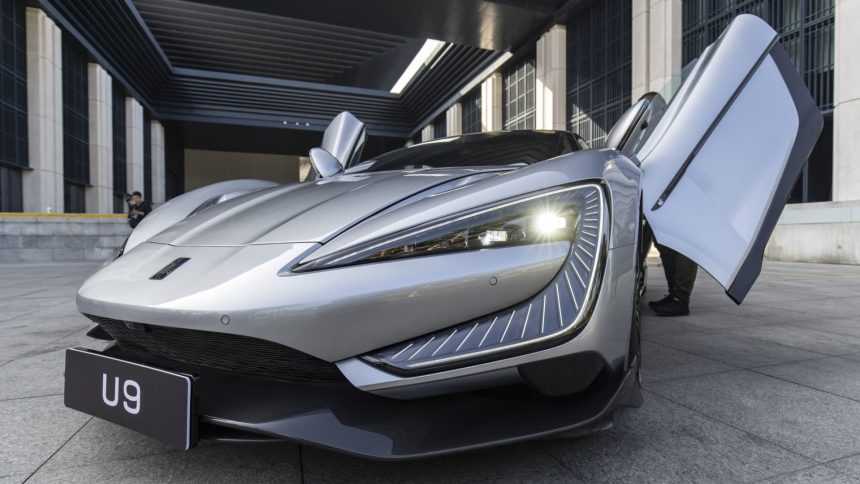Chinese automaker BYD this weekend unveiled a new electric supercar that it says can hit speeds similar to high-end models produced by industry giants like Ferrari.
The U9 supercar will be part of BYD’s luxury brand Yangwang, which was only introduced last year and has launched two other vehicles.
According to BYD, the U9 will be able to reach a top speed of 309.19 kph, or 192.12 mph. It will also be able to accelerate to 100 kph within 2.36 seconds.
This is comparable to supercars produced by long-established brands like Ferrari, whose hybrid SF90 Stradale model can accelerate to 100 kph in 2.5 seconds, according to the company’s website.
Prices for the U9 will start from 1.68 million yuan ($233,424) and deliveries are due to begin this summer, BYD said in a press release.
The U9 will be powered by the so-called e4 Platform, as well as the BYD-developed DiSus-X Intelligent Body Control System, according to the company.
As with previous BYD cars, the U9 will have a lithium iron phosphate battery, also known as an LFP — these types of power units have become increasingly popular among electric vehicle makers, as they do not require expensive metals like cobalt, making them cheaper. China is a key market for LFP production.
BYD in 2023 produced just over 3 million new-energy vehicles, it said earlier this year. Just more than half of these, or 1.6 million, were battery-only passenger cars, while 1.4. million were hybrid vehicles. A large proportion of BYD’s cars sat in a lower price range, with some of the company’s most popular cars starting as low as 73,800 yuan.
While BYD’s main production and sales focus lies in China, the company has set its sights on global expansion. Last year it said it would open its first factory in Europe, and the Hungarian government confirmed Monday that Prime Minister Viktor Orban had met with BYD leaders over the weekend to discuss plans for a production plant.
Questions remain over the scope for international expansion, as the European Union and the U.S. government want to boost their local electrical vehicle sectors.
Beijing has meanwhile encouraged international expansion for Chinese electrical vehicle makers in its latest push for the industry, which has been heavily supported by the government through measures like subsidies.
Read the full article here




